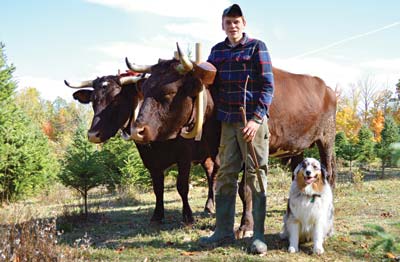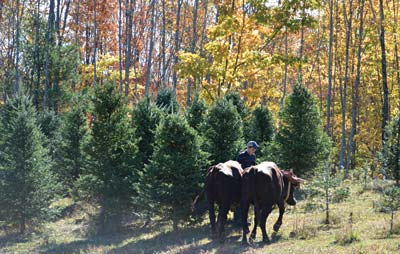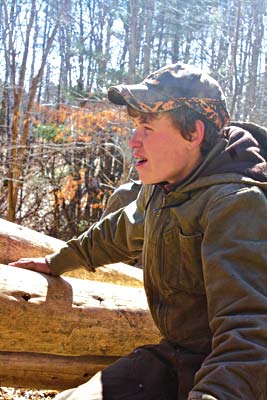 |
| Gil Whitehead with Star and Red – and one of two Aussies on the farm. English photo |
 |
| Whitehead heads into the Christmas tree plantation with his team of oxen. In winter, the oxen haul out Christmas trees that customers select and Whitehead cuts. English photo |
By Jean English
Sixteen-year-old Gil Whitehead of MOFGA-certified organic Winterberry Farm in Belgrade is a young man with a plan – and a team of oxen, an organic Christmas tree operation, a boat and lobster fishing business, a cabin-in-the-making and more.
When Whitehead went to Sturbridge Village in Massachusetts and then to agricultural fairs as a kid, he was especially interested in the oxen. So when he was 10 years old, he got Star and Red as 3-week-old calves through the Farmington 4-H club he had joined. Another 4-H participant helped him train the team, and Whitehead showed them at 4-H events for a couple of years. Now he takes them to the Common Ground Country Fair, where he and the team regularly win ribbons, and he is an instructor at MOFGA’s low-impact forestry workshops.
Whitehead says oxen are less expensive to purchase and keep than horses. A pair of calves will sell for about $300. They live on pasture in summer and consume about a bale of hay per day in winter.
At Winterberry Farm, Whitehead uses the oxen to bring in firewood from the woodlot, plow and spread manure, mow grazing fields, haul vegetables up the hill to the farm store and to transport Christmas trees from the tree lot to a parking area.
The Christmas Tree Business
When Whitehead and his family moved to their Belgrade farm in 2001, his mother, Mary Perry, says, “the first thing I did was to plant these trees for Gil, hoping he would use the money to further his education.” Perry’s father, Ken, had started a Christmas tree lot on his land in Lebanon, Conn., decades earlier. “He raised enough money selling those trees to build a home in the 1970s for his family and to homestead,” said Perry.
The initial planting in Belgrade included 300 young balsam firs pulled from the nearby woods in the spring and transplanted to a field, with trees set about 5 feet apart in each direction. As the trees grew, tree farmer Abbott Ladd (now deceased) of Ladd Tree Farm in Belgrade mentored Whitehead for five years, including showing him how to prune with a machete – something Whitehead now does each July, and again, touching up a little, in November.
Once the trees were big enough to sell, Whitehead set up a system in which customers pick out a tree, which he cuts and which Star and Red transport to the parking area. Winterberry Farm customers love the holiday experience, he says.
The farm now has 3 acres of Christmas trees and is one of four MOFGA-certified organic Christmas tree farms in Maine. Whitehead continues to transplant about 100 trees each year and currently sells about 50 annually for $40 each.
Sometimes he adds a little compost to the planting hole, but Whitehead finds that the soil adjacent to the woodlot generally needs no amendments to grow good Christmas trees. He controls vegetation between the trees with a push mower, prunes out any defective tree growth, and culls any off-trees. The trees have not had any significant insect problems.
 |
| The cabin in progress. Photo courtesy of Winterberry Farm |
The business fits well with his school vacation schedule. Whitehead is a homeschooled student who also has a modified schedule at the Maine Academy of Natural Sciences (MeANS). He applies his work at home toward the standards needed to receive his high school diploma. He’ll graduate in 2017 with his class at MeANS.
Asked if he finds Christmas trees profitable enough, he smiles and says, “I’d recommend it to others.” His enthusiasm is reflected in the fact that he is the youngest tree lot owner in the Maine Christmas Tree Association.
Building an Integrated Life
Whitehead’s other budding occupation is that of lobsterman. “He started that when he was 4 years old,” says Perry, and, through the Wooden Boat School in Bath, “he built his own skiff at age 11 and rowed every third day [during the season] to check his 30 traps.” Now he has a motorized, 16-foot wooden skiff that he purchased with his earnings. Under an apprentice program from the state and with a mentor, he runs 40 traps from August through December in New Harbor. Once he is 18 years old and has put in 1,000 hours of lobster fishing at this scale, he’ll qualify for a commercial license to fish for lobster in the same New Harbor zone and will be able to set more traps.
With the money from selling Christmas trees, he is purchasing a small truck so that he’ll be able to drive himself to New Harbor.
Whitehead will also use some of his savings for a 6-month semester program in outdoor skills, starting in January 2017, in the Upper Gaspé of Quebec, Canada.
Finally … for now … Star and Red are helping Whitehead build a cabin in the woods. He cut the logs with a crosscut saw, peeled them with a draw shave, notched them with a handmade scribe and used the oxen to roll the logs up to make the cabin walls. He acquired the skills for this work through programs at Hidden Valley Nature Center in Jefferson, Maine, and by working weekly with Ray Reitze Jr. of Canaan on Native American skills and guiding programs.
“The oxen have shaped Gil into a young man,” says Perry, noting that he works them daily. “Those steers and Gil have grown up together, always literally at shoulder level to one another. Gil, now at 6 feet 2 inches, and his oxen are still shoulder to shoulder, and one step at a time they are getting their work done, quietly and proficiently.”
